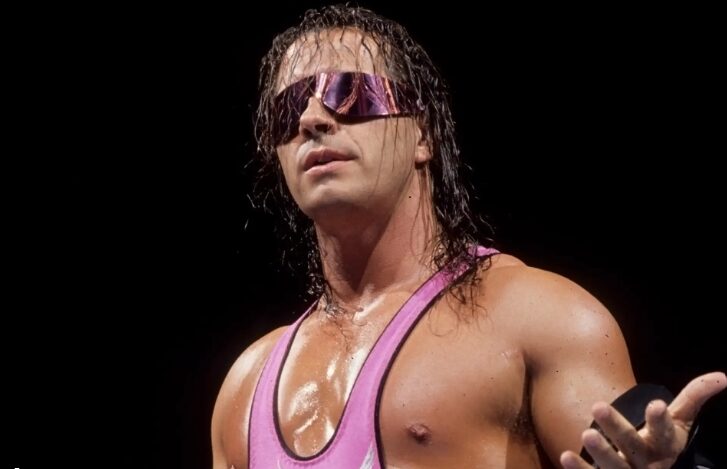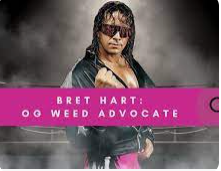
Pro wrestling faced a moment of reckoning in the early ’90s. Marijuana, a standard go-to source of relief after matches and during long road trips, was banned in the WWF. The plant was on the prohibited list with the company staring down the barrel of potential regulatory blowback. Meanwhile, painkillers and other pills ran rampant alongside booze. Wrestlers then mentioned their disapproval of the decision from then-owner Vince McMahon. However, one wrestler stood out among the ranks as one of the most vocal supporters of marijuana use in pro wrestling: Bret the Hitman Hart.
Had the company listened to the likes of Hart, the then two-plus decades of dark days and early deaths may not have ravaged the industry. While we can’t undo the past, wrestling has, thankfully, turned a corner on cannabis in recent years, ushering in a new era of health and wellness in the sport. With the now-WWE fully coming back around on weed, Bret Hart deserves his moment in the sun as one of the earliest and most ardent supporters of cannabis in the sport.
The Party Comes to a Halt
Hart has been open about his drug use for some time now. Previous interviews and documentaries like 350 Days, as well as the Adrian Adonis “Dark Side of the Ring” episode, highlighted Hart’s fondness for marijuana as well as cocaine. Like many, the WWE Hall of Famer credits days doing the white powdery substance with Adonis, “Rowdy” Roddy Piper, and other locker room leaders at the time with helping him grow as a professional wrestler.
By 1991, wrestlers were still using drugs to deal with 300-plus days on the road, often accompanied by painful injuries. Steroids were also used to recover from injuries and enhance the appearance of in-ring performers. The massive WWF stars of the ’80s were primarily supplied by Dr. George Zahorian D.O., a Pennsylvania urologist and Pennsylvania State Athletic Commission member. Over time, Zahorian and WWF stars endeared themselves to one another, leading to wrestlers receiving illegal supplies of anabolic steroids and other highly potent drugs facilitated by the doctor.
Zahorian was apprehended and put on trial in 1991 for his activities. While on trial, he confessed to providing WWF wrestlers with the drugs. Zahorian’s conviction led to Vince McMahon facing federal charges in 1994, but was subsequently acquitted. With the pressure mounting against the wrestling industry leader, McMahon and WWF took action in 1991, banning steroids as well as marijuana and other popular drugs.
A well-shared anecdote from Hart recalled his last foray with weed before the drug tests arrived in WWF. He recalled receiving a bag of dirt weed from Mexico, gifted by two buddies he dubbed Cheech and Chong. After receiving the gift in El Paso, Hart remembers Vince McMahon delivering the news of the pot prohibition just before TV tapings were set to go live in San Antonio.
“Vince said that with the FBI and the media waiting to pounce on him, the WWF couldn’t take a chance on another scandal,” recalled Hart, saying he has always felt the decision was shortsighted, predicting the ban would lead to increased alcohol and pill usage among wrestlers. He elaborated, “Instead of smoking a bit of weed holed up in their hotel rooms talking about the business, they roamed hotel bars drunk and on downers.”
While many disliked WWF’s decision, Hart was one of the few to push back against the rule. Nelson Frazier Jr., who wrestled in WWE as Mabel, Viscera and Big Daddy V, recalled Hart speaking up for wrestlers’ right to use cannabis at company meetings. “Now that’s a leader,” he said.

A Lasting Impact
Pressure from federal regulators and ongoing cannabis prohibitions made Hart’s persistence come up short during his time in the WWF. The policy remained in place during his run with the company and for many years after. However, Hart set a precedent that continued over the years. Cannabis use continued amongst wrestlers, although they now risked steeper penalties, including several thousand dollar fines, loss of titles, suspensions, and firings in some cases.
After Hart departed from the company in 1997, it’s unclear if anyone immediately picked up the mantle as the most pro-pot pro wrestler among the bunch. No doubt that role was filled in 2001 when ECW legend Rob Van Dam joined the company, now known as WWE. The high-flying, high-living RVD, a prominently pro-pot wrestler in ECW, continued to advocate for the plant behind the scenes in WWE, occasionally sneaking in references on TV as well. However, his consumption and support for the plant were largely muted.
Much like Hart’s lobbying, the company did not change its pot policies much during RVD’s time with the company. The company increased its testing at one point. Facing the backlash of the Chris Benoit double murder and suicide in 2007, WWE increased its scrutiny for drug testing and penalties. During this period, Teddy Hart, Bret’s nephew and once rising star in pro wrestling, found himself embroiled in numerous drug charges involving cannabis, hard drugs, and other non-drug charges. He continues to struggle with drugs and other legal run-ins.
By 2022, WWE had softened its stances on cannabis, much like the rest of the United States. Recent reports suggest that the company has not fired a performer over a positive pot test in years and that fines for positive tests appear to be a thing of the past. Randy Orton is credited with being the leader who finally changed the policy, along with other WWE talent.
While Hart’s efforts didn’t change minds in the ’90s, his insistence helped set a tone in the locker room that showed how leaders can advocate for cannabis use. It’s understandable why WWF didn’t go along with the policy change at the time. Still, after witnessing the last two or so decades of destruction caused by pills and alcohol abuse, it’s hard to argue that Hart wasn’t right all along. Imagine what could have been for so many lives had a different path been chosen.








